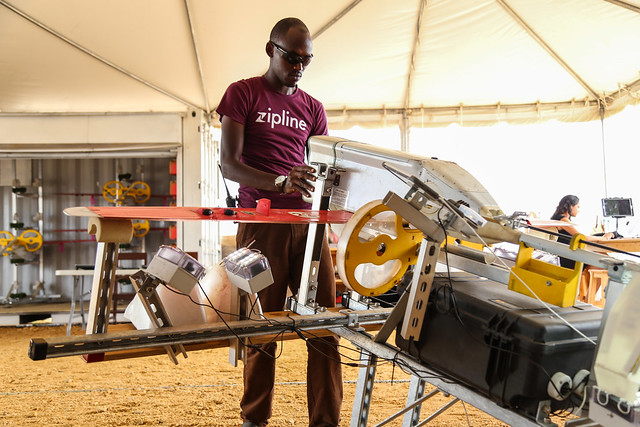Drones in Africa Help Fight Coronavirus by Airdropping Medical Supplies
 The mission of Zipline, a company started in 2014 and based in San Francisco, is to “provide every human on Earth with instant access to vital medical supplies.” To accomplish this goal, the company has created a drone delivery service where drones in Africa distribute lifesaving medical supplies to remote clinics in Ghana and Rwanda. More recently Zipline has expanded to other locations across the globe, including the U.S.
The mission of Zipline, a company started in 2014 and based in San Francisco, is to “provide every human on Earth with instant access to vital medical supplies.” To accomplish this goal, the company has created a drone delivery service where drones in Africa distribute lifesaving medical supplies to remote clinics in Ghana and Rwanda. More recently Zipline has expanded to other locations across the globe, including the U.S.
Poverty in Rwanda and Ghana
Rwanda is a rural East African country that relies heavily on farming. Although the country has made improvements in recent years, the 1994 Rwandan genocide damaged the economy and forced many people into poverty, particularly women. As of 2015, 39% of the population lived below the poverty line and Rwanda was ranked 208th out of 228 countries in terms of GDP per capita. On top of this, Rwanda only has 0.13 physicians per 1,000 people, which is insufficient to meet health care needs according to the World Health Organization (WHO).
Ghana, located in West Africa, has fewer economic problems than neighboring countries in the region. However, debt, high costs of electricity and a lack of a stable domestic revenue continue to pose a threat to the economy. The GDP per capita was $4,700 as of 2017, with 24.2% of the population living below the poverty line. Although Ghana has a higher ratio of physicians per 1,000 people than Rwanda, with 0.18 physicians, it still falls below the WHO recommendation of at least 2.3 physicians per 1,000.
Benefits of Drone Delivery Services
On-demand delivery, such as drone delivery services, are typically only available to wealthy nations. However, Zipline evens the playing field by ensuring that those living in poorer and more remote regions also have access to the medical supplies they need. Zipline has made over 37,000 deliveries. In Rwanda, the drones provide deliveries across the country, bypassing the problems of dangerous routes, traffic and vehicle breakdowns, speeding up delivery and therefore minimizing waste. Additionally, Zipline’s drones in Africa do not use gasoline but, instead, on battery power.
Drone Delivery Services and COVID-19
Zipline’s services have been especially crucial during the COVID-19 response. Zipline has partnered with various nonprofit organizations (NGOs) and governments to complement traditional means of delivery of medical supplies on an international scale. This has helped to keep delivery drivers at home and minimize face-to-face interactions. As there are advances in treatments for COVID-19, delivery by drones in Africa has the potential to provide access to the vulnerable populations who are most at risk. At the same time, it can help vulnerable people stay at home by delivering medications directly to them or to nearby clinics, minimizing travel and reducing the chance of exposure. Zipline distribution centers have the capability to make thousands of deliveries a week across 8,000 square miles. Doctors and clinics simply use an app to order the supplies they need, receiving the supplies in 15 to 20 minutes. The drones are equipped for any weather conditions.
New means of providing medical equipment are helping to ensure that the world’s poor have access to the supplies they need. A company called Zipline has been using drones to deliver medical supplies to Africa, specifically in Rwanda and Ghana. During the COVID-19 pandemic, drones have been crucial in providing people and clinics with the medical supplies they need.
– Elizabeth Davis
Photo: Flickr
